http://www.specialequestrians.org

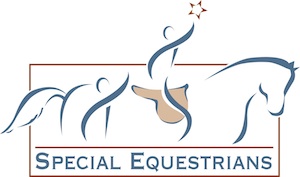
Special Equestrians
2800 Street Road
Warrington, PA 18976
Mailing Address:
P.O. Box 1001
Warrington, PA 18976
Phone: 215-918-1001
MAKE AN INQUIRY
View our WEBSITE
EIN: 23-2196098Founded: 1982
View our PHOTO GALLERY
Profile Last Updated December 17, 2025Public Charity

The Guardian Seal of Transparency is awarded annually to recognize an organization's commitment to transparency and accountability by their willingness to make comprehensive data about their programs, horse care practices, and governance available for public scrutiny. The Guardian Seal of Transparency is NOT an endorsement.
Last Updated: May 2, 2025
Special Equestrians has not attained the Guardian designation for 2026.

MISSION & PROGRAMS
Mission:The mission of Special Equestrians is to improve the physical, mental and emotional well-being of individuals with disabilities through the equine experience. We harness the healing power of horses to transform lives. Horses are involved in all aspects of our programming, which includes mounted and unmounted sessions and on- and off-site programming. Our herd includes a variety of sizes and breeds, including miniature horses, a miniature donkey, ponies and horses, ensuring that each client works with an equine that best serves their needs.
Our organization conducts Equine Assisted Services in accordance with the EQUUS Foundation Guidelines on Qualifications of Organizations Conducting Equine Assisted Services (EAS).
Our organization provides outreach and/or public education programs involving horses.
100% of our total programs and services are equine-related.
Our organization is directly responsible for the care and shelter of equines involved in our programs.
Our organization does not CURRENTLY use satellite, overflow, foster, and/or outreach facilities.
Please describe what steps your organization takes to ensure that:
1) all interactions between your equines and people are mutually beneficial and conducted in accordance with the Guidelines for Human-Equine Interactions stated below;
2) all equines in the care of our organization and/or equines that participate in the organization's program have access to clean drinking water at all times; nutritious food in sufficient quantity, including natural forage such as pasture grass and/or hay; appropriate veterinary, farrier, and dental care; shelter and protection from the weather; sufficient safe space to move around comfortably on a daily basis; and daily opportunity to freely interact and have contact with other equines:
Special Equestrians’ equine management policy is built on the foundational belief that horses must be fit, healthy and handled well to be happy in their jobs. Therapy horses have their own special needs — dealing with physically unbalanced, intellectually challenged, and occasionally emotionally traumatized individuals, is a challenging job. With special needs riders, we have safety concerns above and beyond those for able-bodied riders. We only accept horses who are serviceably sound with no history of ongoing vices or misbehaviors; who are tolerant of being handled by a number of people with varying levels of equine knowledge; and who are comfortable dealing with the sights, sounds, and activities associated with therapeutic riding and equine-facilitated learning. Our Program staff has created spreadsheets to manage the health and work schedule of each horse. Spreadsheets include vaccination and dental records, monthly horse usage totals, and exercise outside of lessons. Information and paperwork on each horse is also stored online on our Equi-Force Content Management System.
Horses are eased into the routine of our program over a two- to three-month trial period that gives us a chance to analyze their strengths and weaknesses and prepare them for our riders—or determine that they are not suited to be therapy horses. Our facility is closed to the public one day a week so horses can rest from the week’s activities, and daily equine use is capped based on each horse’s age and how much they can tolerate physically and/or emotionally. They are ridden by experienced riders to maintain their mental and physical fitness a few days a week, often under the tutelage of professional dressage and jumper trainers who offer their expertise to plan the ongoing exercise program. Horses are taken on trail rides and off the property to keep them fresh. Horses are assigned only to instructors and riders deemed compatible and changed if/as problems present themselves.
Horses’ own abilities are matched to riders’ weight, height, skill level, and personality. As the riders or horses change over time, partnerships are changed when appropriate. We are as respectful of a horse's mental soundness and of his/her physical soundness. If a horse demonstrates soreness or unease, we immediately investigate need for medical attention, rest, rehab, and/or change in routine or training. Because we use many volunteers in our programs, Special Equestrians offers extensive volunteer training on appropriate horse handling and signs of illness to notify staff. We keep a large enough active herd so that if a horse needs to be pulled from lessons for recovery time, the other horses bear no unreasonable extra burden.
We have been bringing on new horses as our current herd ages and as we expand programming. In 2024 3 geldings joined the program: Lugnut, a 13-year-old Miniature Horse; Opus, a 20-year-old Thoroughbred; and Vanilla, a 20-year-old Welsh pony. A longtime therapy horse, JZ, was discharged from the program as he was exhibiting signs that he was no longer happy as a therapy horse. His owner pays to board him at our barn as a retired horse.
Equine Assisted Services (EAS) Overview:
Overview of our programs involved with providing EAS to individuals with special needs:
Special Equestrians operates year-round with 15 therapy horses, 25 full- and part-time staff members, and 220 volunteers. 58% of our riders are aged 18 or younger. Special Equestrians offers a range of private, semi-private and group lessons targeted to specific physical, mental, and emotional needs:
INDIVIDUAL LESSONS
Therapeutic Riding is Special Equestrians’ largest program, offered to individuals who have challenges associated with a physical, cognitive or social-emotional disability. Students in our therapeutic riding program build confidence and independence as they develop mastery of different riding skills at their own pace. Lessons are structured to provide students with educational and hands-on opportunities to promote the development of horsemanship skills such as basic horse care and riding skills.
Hippotherapy is an evidence-based practice conducted at our barn by specially trained occupational and physical therapists for children and adults with neuromotor, cognitive and/or sensory difficulties. Instructors use the horse’s movement as a therapy tool to achieve individualized goals aiming to facilitate overall function in a person’s everyday life. The three-dimensional movement of the equine can improve the flexibility, posture, balance, core strength and mobility of the rider.
Special Equestrians offers two ground-based programs for children and teens with a mental health diagnosis in partnership with the Bucks County Department of Behavioral Health/Developmental Programs. Therapeutic Horsemanship program is conducted as weekly 30-minute sessions run by a PATH International certified equine specialist. Sessions involve working with the equine on the ground and learning horsemanship skills to build confidence, self-esteem, coping skills and social-emotional skills. Equine-Facilitated Psychotherapy (EFP) is conducted as weekly therapy sessions by independent contractors employed by Lenape Valley Foundation or Special Equestrians' licensed social worker and a certified equine specialist. Working through these challenges allows the equine specialist and mental health professional opportunities to teach coping skills for daily life.
Silver Saddles is a program specially focused on improving overall strength, endurance and flexibility for people over the age of 55 with age-related disabilities. Lessons are focused on partnership with the horse through the use of classical dressage principles, which increases students’ range of motion, endurance, and core strength.
Special Equestrians offers a one-week summer horse camp in August for children with disabilities ages 8 to 16. Many already participate in weekly programs. Activities include group therapeutic riding lessons and unmounted instruction on horse care and stable management, arts and crafts, team-building activities, and downtime to relax with therapy dogs. At the end of the week, campers participate in a horse show to demonstrate their new skills to family and friends.
GROUP LESSONS
Special Equestrians is offering two types of equine-assisted activities that meet community partners’ needs as well as our safety protocols:
1) Off-site, ground-based programming. Special Equestrians brings two horses directly to community partners for ground activities. The goal is to provide enjoyment and learning opportunities for individuals with developmental, intellectual and emotional disorders. For students on the autism spectrum these sessions provide a unique opportunity for growth and development in social communication through activity-based learning that harnesses the transforming power of interaction with horses. For all participants, it helps them overcome a fear of the horses and regulate behaviors. They will learn safety awareness around horses, and how to groom and a general overview of horsemanship.
2) Small groups of on-site visits to Special Equestrians for mounted and unmounted programming. These programs operate in close collaboration with local alternative schools, adult programs for individuals with autism/intellectual disabilities, children in foster care, cancer support groups, and at-risk youth. Lessons and workshops help promote team building with peers, positive communication skills, increasing awareness of others, and empathy. The trusting nature of the horse-human connection encourages participants to lower their defenses and their habitual reactivity and become more receptive to new ideas and positive relationships with others.
In additional we provide community engagement activities, working with various youth organizations as well as students whose high school curriculums include community service hours. We also host corporate volunteer outings where large groups or teams come to assist with various projects around the barn or on the property.
Finally, Special Equestrians hosts area groups within the Girl Scouts, Boy Scouts, and Eagle Scouts organizations. Some are looking to earn horseback riding badges, while others assist with various projects around the barn or on the property.
Equine Assisted Services (EAS) and Providers:
Our organization provides the following Equine Assisted Services (EAS):
Adaptive/Therapeutic Riding
Adaptive/Therapeutic Unmounted Horsemanship
Psychotherapy/Counseling
Occupational Therapy/Physical Therapy/Speech-Language Pathology
13: Total number of Equine Assisted Service Providers at Special Equestrians
1 Dana Fielding
FACILITY PARTICIPATION:
Special Equestrians
RELATIONSHIP: Employee
SERVICES PROVIDED:
Adaptive/Therapeutic Riding
Adaptive/Therapeutic Unmounted Horsemanship
DEGREES, LICENSES AND/OR CERTIFICATIONS
PATH Intl. Certified Therapeutic Riding Instructor in Training, PATH Equine Specialist in Mental Health & Learning, B.S. in Biological Psychology
2 Debbie Saffren
FACILITY PARTICIPATION:
Special Equestrians
RELATIONSHIP: Employee
SERVICES PROVIDED:
Occupational Therapy/Physical Therapy/Speech-Language Pathology
DEGREES, LICENSES AND/OR CERTIFICATIONS
PATH Intl. Registered Therapist in Hippotherapy, American Hippotherapy Association Level I certification
3 Janice Witt
FACILITY PARTICIPATION:
Special Equestrians
RELATIONSHIP: Employee
SERVICES PROVIDED:
Adaptive/Therapeutic Riding
Adaptive/Therapeutic Unmounted Horsemanship
Occupational Therapy/Physical Therapy/Speech-Language Pathology
DEGREES, LICENSES AND/OR CERTIFICATIONS
PATH Intl. Certified Therapeutic Riding Instructor, Registered & Licensed Occupational Therapist, B.S. in Psychology, Master of Science in Occupational Therapy
4 Jessica Kohn, MSW
FACILITY PARTICIPATION:
Special Equestrians
RELATIONSHIP: Employee
SERVICES PROVIDED:
Adaptive/Therapeutic Unmounted Horsemanship
Psychotherapy/Counseling
DEGREES, LICENSES AND/OR CERTIFICATIONS
MSW, West Chester University
PATH Intl. Equine Specialist in Mental Health & Learning
5 Kate Connor, LPC
FACILITY PARTICIPATION:
Special Equestrians
RELATIONSHIP: Independent Contractor
SERVICES PROVIDED:
Psychotherapy/Counseling
DEGREES, LICENSES AND/OR CERTIFICATIONS
Licensed Professional Counselor employed by Lenape Valley Foundation
6 Kathy Harris
FACILITY PARTICIPATION:
Special Equestrians
RELATIONSHIP: Employee
SERVICES PROVIDED:
Adaptive/Therapeutic Riding
Adaptive/Therapeutic Unmounted Horsemanship
DEGREES, LICENSES AND/OR CERTIFICATIONS
PATH Intl. Certified Riding Instructor
7 Kira Kraiman
FACILITY PARTICIPATION:
Special Equestrians
RELATIONSHIP: Employee
SERVICES PROVIDED:
Adaptive/Therapeutic Riding
Adaptive/Therapeutic Unmounted Horsemanship
DEGREES, LICENSES AND/OR CERTIFICATIONS
PATH Int. Certified Therapeutic Riding Instructor in training
8 Lara Feldman
FACILITY PARTICIPATION:
Special Equestrians
RELATIONSHIP: Employee
SERVICES PROVIDED:
Adaptive/Therapeutic Riding
Adaptive/Therapeutic Unmounted Horsemanship
DEGREES, LICENSES AND/OR CERTIFICATIONS
PATH Intl Advanced Level 1 Certified Instructor, Certified Equine Massage Practitioner, B.S. in Equine Science, M.S. in Animal Science, an MBA and is currently pursuing her Doctorate in Organizational Business Leadership.
9 Laurie Kelso, LPC
FACILITY PARTICIPATION:
Special Equestrians
RELATIONSHIP: Independent Contractor
SERVICES PROVIDED:
Psychotherapy/Counseling
DEGREES, LICENSES AND/OR CERTIFICATIONS
Licensed Professional Counselor employed by Lenape Valley Foundation
10 Leslie Mangigian
FACILITY PARTICIPATION:
Special Equestrians
RELATIONSHIP: Employee
SERVICES PROVIDED:
Adaptive/Therapeutic Riding
Adaptive/Therapeutic Unmounted Horsemanship
DEGREES, LICENSES AND/OR CERTIFICATIONS
Bachelor's Degree in Elementary Education, Master’s Degree in Special Education, PATH Intl. Certified Therapeutic Riding Instructor in training
11 Megan Glenn
FACILITY PARTICIPATION:
Special Equestrians
RELATIONSHIP: Employee
SERVICES PROVIDED:
Occupational Therapy/Physical Therapy/Speech-Language Pathology
DEGREES, LICENSES AND/OR CERTIFICATIONS
B.S. in Therapeutic Recreation, M.S in Occupational Therapy, in the process of Hippotherapy Certification from the American Hippotherapy Association.
12 Sally Hibbert
FACILITY PARTICIPATION:
Special Equestrians
RELATIONSHIP: Employee
SERVICES PROVIDED:
Adaptive/Therapeutic Riding
Adaptive/Therapeutic Unmounted Horsemanship
DEGREES, LICENSES AND/OR CERTIFICATIONS
PATH Certified Therapeutic Riding Instructor, Certified Centered-Riding Instructor-Level 1
13 Valerie DiPasquale
FACILITY PARTICIPATION:
Special Equestrians
RELATIONSHIP: Employee
SERVICES PROVIDED:
Adaptive/Therapeutic Riding
Adaptive/Therapeutic Unmounted Horsemanship
DEGREES, LICENSES AND/OR CERTIFICATIONS
PATH Intl. Certified Therapeutic Riding Instructor
Outreach and/or Public Education:
Special Equestrians holds two student horse shows every year: one in the spring and the other in the fall. These events introduce the community to the power of therapeutic riding and the programs offered at SE and give families and community members an opportunity to see riders build confidence by displaying their talents and receiving ribbons for showing their horse. In addition, we offer a Holiday with the Herd open house in December that allows the community to get an up-close look at our horses and get their photo taken with a horse.
Special Equestrians also transports one or two of our therapy horses to area schools, human service agencies and senior living communities, during which attendees are able to interact with the horses for one hour in an open-house format. During these off-site visits, we have witnessed many meaningful connections occur between humans and our horses. Attendees respond well to the calm and trusting nature of horses and their bright, soulful eyes reinforce the deep synergies between human and equines.
Finally, Special Equestrians attends local community day events and brings 1-2 horses for attendees to groom, pet and take pictures with.
Research/Medical Use of Equines:
Our organization has never made, and would not ever consider making, equines available for research studies or medical training that involves invasive procedures and/or that which may cause pain or suffering to the equine.
Religious Affiliation:
Our organization does not promote religious education, religious purposes, or a specific religious faith or use donations for religious education or religious purposes; require participants to be of a certain faith; require participation in religious, instruction, activities or services; or require participation in prayer, worship, religious instruction or other religious activities as a condition of receiving social or secular services offered.
Auction Donation:
Our organization has never allowed, or would not consider allowing, an equine to be sold, transferred, released, or otherwise placed into possession of any person or organization that would cause or allow the equine to be sold at auction for slaughter.
POLICIES: INTAKE, ASSESSMENT & TRAINING
Prior to a horse being accepted and/or arriving at the facility, the organization has the following policies in place:The owner of a potential equine is interviewed over the phone or in person prior to seeing the equine
The equine is evaluated at its place of residence
The owner completes an application/contract which constitutes the agreement between the owner and our organization when the equine is acquired from the equine's owner other than by seizure or by abandonment
The owner is financially responsible for the shipping of the equine to and from the organization
If health records are not available or are out-of-date, our veterinarian will administer appropriate vaccinations
A health certificate signed by a veterinarian and dated no more than seven days prior to arrival is provided to our organization either prior to or upon arrival of the equine attesting to the health status of the equine
Trial Period: Check all that apply:
Equines are on trial for up to 30 days
Equines are on trial up to 60 days
Equines are on trial for 60 or more days
The trial period may be reduced based on the equine's progress
During the trial period, the organization accepts total financial responsibility for the care of the equine, including board, feed, shoeing and any necessary veterinary care
During the trial period, the organization accepts financial responsibility for the care of the equine, including board, feed, shoeing and any necessary veterinary care, up to a fixed amount agreed upon by the organization and the owner
The trial period may be terminated by either the organization or the owner for any reason
During the trial period, the owner/donor is financially responsible for the care of the equine, including board, feed, shoeing and any necessary veterinary care
Upon intake, the organization has the following quarantine policy in place:
The equine is confined to a designated and separate area for isolation and quarantine at the facility for a prescribed period of time
The equine is confined to a designated and separate area for isolation and quarantine off-site for a prescribed period of time
The equine is not quarantined
The typical length of quarantine is: 10 to 20 days
Following arrival of the equine at the facility, the following is performed:
Physical examination to include temperature, pulse and respiration by a veterinarian upon arrival
Physical examination to include temperature, pulse and respiration by a trained staff member upon arrival
A Henneke Body Conditioning Score or other body conditioning score is assigned by a veterinarian upon arrival
Photographs are taken of each equine upon arrival at the facility and kept with the equine's health records
Physical examination by a farrier
Physical examination by a dentist
A Henneke Body Conditioning Score or other body conditioning score is assigned by a trained staff member upon arrival
The equine is microchipped if the equine has not been microchipped
Horses are assessed for following skills and behaviors:
Retrieval from a pasture/paddock
Leading with a halter and lead rope
Temperament, disposition and attitude, such as rated from very calm to very high spirited
Saddling
Bridling
Lunging
Loading onto and unloading off a trailer
Mounting and dismounting
Riding at the walk
Riding at the trot
Riding at the canter
Riding by a beginner and/or unbalanced rider
Tolerance to unusual objects and loud noises
Known vices, i.e., cribbing, biting, kicking, weaving, stall walking, etc
Grooming
Bathing
Clipping
Tolerance to multiple handlers at the same time
Jumping
Driving (Pulling a carriage)
Our organization has the following policies and procedures in place pertaining to the ongoing assessment of horses in its care:
Physical examination by a veterinarian at least annually
The Henneke Body Condition score or other body conditioning score is updated at least annually by the veterinarian
Vaccinations are administered at least annually
Photographs are taken of each equine annually and kept with the equine's health records
Equines at our facility may be treated by an equine chiropractor
Equines at our facility may be treated by an equine acupuncturist
Equines at our facility may be treated by an equine massage therapist
Equines at our facility may be treated by an equine nutritionist
The Henneke Body Condition score or other body conditioning score is updated at least annually by a trained staff member
Photographs are taken of each equine monthly and kept with the equine's health records
Our organization has the following policies and procedures in place pertaining to the weight-carrying or workload capabilities of horses/equines that are ridden in our care:
Our organization evaluates the weight-carrying and workload limitations for each equine that is ridden at least annually
Our organization maintains a written record of the weight-carrying and workload limitations for each equine that is ridden
Our organization does not evaluate the weight-carrying and workload limitations for each equine that is ridden
No equines are ridden; not applicable
The following variables are considered in determining the weight-carrying and workload limitations for each equine that is ridden:
Equine age, weight, breed, body condition, fitness, balance, health and soundness
Equine conformation to include the top line, length of back, strength and width of loin, bone density (measured by the circumference of the cannon bone just below the knee)
Size, shape, condition and angle of the hooves
Participant weight, height, body proportions, balance, fitness and riding skills as well as behavioral issues and safety concerns
Weight and proper fit of the saddle and other equipment
Terrain and footing in the working environment
Duration and frequency of working sessions, as the frequency with which an equine is subjected to maximum weight carrying and/or workload
Nature and pace of work, repetitive or varied, radius of turns, degree of incline and regularity of footing when equine is subject to maximum weight-carrying capacity
Temperature and/or weather conditions
Seasonal impact on the equines' workload and weight-carrying capabilities and limitations
Our organization does not evaluate the weight-carrying and workload limitations for each equine that is ridden
No equines are ridden; not applicable
Horses provided formal training (groundwork or riding): Daily
POLICIES: BREEDING
The organization has the following policies related to breeding and stallions:Our organization does not conduct breeding of equines owned or under the care of our organization.
Our main facility where our organization conducts its programs does NOT breed equines.
One or more of the facilities where our organization conducts its programs, including foster/temporary care facilities, breeds equines
One or more of the facilities where our organization conducts its programs, including foster/temporary care facilities, are permitted to house stallions
POLICIES: EUTHANASIA
The organization has the following policies related to euthanasia:Our organization will never have an equine euthanized for space
Our organization will have an equine euthanized upon the recommendation of the veterinarian if the equine is a threat to itself, other equines, or people
Our organization will have an equine euthanized upon the recommendation of the veterinarian after all reasonable treatment options have been explored
Euthanasia is done on site when possible to decrease trauma from transport
Disposal of the carcass is handled within 24 hours
Our organization will never have an equine euthanized under any circumstances
Euthanasia is done at the veterinarian's facility
The following are authorized to administer the procedure for your organization in accordance with state laws:
Veterinarian
A certified euthanasia technician
Senior staff with appropriate training
Employee of animal control shelter or humane society with appropriate training
Veterinary student under the supervision of a licensed veterinarian
Not applicable. Our organization prohibits euthanasia under any circumstances
POLICIES: RE-HOMING
View Re-homing AgreementOur organization has the following re-homing (adoption/purchase) policies and procedures in place:
All potential adopters/purchasers complete a written contract which constitutes the agreement between our organization and the new owner
Our organization does NOT re-home an equine to first time equine owners
Our organization will only re-home an equine to a location where another equine resides
Potential adopters/purchasers must visit our organization and be observed with the equine on site
Adopters/purchasers are NOT required to provide updates
The distance of a potential adopter/purchaser's home from our facility is a consideration for when re-homing an equine
Our organization conducts a site visit of the adopter/purchaser's facility before the transfer of the equine to the adopter/purchaser's facility
Potential adopters/purchasers are encouraged to do a short-term, on-site foster with the equine
Our organization has the following policies and procedures related to horses that need to be retired, are no longer able to contribute to the mission of the organization, and/or are no longer manageable:
Equines may remain at our organization for their lifetimes
Equines may be found suitable homes by our organization
Equines may be returned to their owners
In the case an equine is unmanageable and demonstrates repeated dangerous behaviors, the equine may be euthanized upon the recommendation of the veterinarian
In the case an equine is unsound and/or unhealthy and cannot be treated to relieve suffering, the equine may be euthanized upon the recommendation of the veterinarian
Equines may be sent to auction
If a suitable home cannot be located within 12 months, the equine may be euthanized
The organization will accept financial responsibility for equines in the current care of the organization that need to be retired or are no longer able to contribute to the mission of the organization if all alternatives have been explored to find the equine an appropriate placement and space is not available for the equine to remain at the organization.
The uploaded Re-homing agreement includes the following re-homing (adoption/purchase) statements:
The agreement reflects that any individual or organization in possession of the equine as of the date of the agreement and any time thereafter is bound to not sell the equine at auction for slaughter or allow the equine to be sold, transferred, released, or otherwise placed into possession of any person or organization that will cause or allow the equine to be sold at auction for slaughter.
The agreement states that should the adopter decide to re-home the equine, the adopter must grant the organization first right of refusal prior to the equine being placed into the possession of any individual or organization intending to take possession of the equine for any reason.
The agreement states that should the adopter decide to re-home the equine, our organization must be notified of the name, address, and telephone number of any individual or organization intending to take possession of the equine for any reason prior to the equine being placed into the possession of such individual or organization.
The agreement states that the re-homed equine CANNOT be sold, adopted, transferred, auctioned, released, given away, or otherwise placed into the possession of another individual or organization under any circumstances and must be returned to our organization should the adopter decide that he/she is no longer able, or no longer wishes, to care for the equine.
The agreement states that should the adopter decide to re-home the equine, our organization must grant approval of any individual or organization intending to take possession of the equine for any reason prior to the equine being placed into the possession of such individual or organization, including being provided written notification of the name, address, and telephone number of any individual or organization intending to take possession of the equine for any reason.
The agreement states that the terms of our organization's agreement will be binding on any future individual or organization taking and/or in possession of the equine for any reason.
The agreement states that re-homed equines cannot be bred
The agreement states that if there is any breach of contract the equine must be returned to our organization
The agreement states that our organization reserves the right to make unannounced visits
The agreement states that our organization reserves the right to make scheduled visits
The agreement states that adopters/purchasers can return an equine to our organization free of charge
The agreement states that adopters/purchasers can return an equine to our organization for a fee
The agreement states that adopters/purchasers are required to provide updates (photos, vet records) for one year
The agreement states that adopters/purchasers are required to provide updates (photos, vet records) for two years
Our organization microchips all equines that are not already microchipped before the adoption and/or transfer of the equine if the organization has the authority to microchip the equine.
The agreement includes the microchip number of the equine.
The agreement states that adopters/purchasers are required to provide updates (photos, vet records) for as long as the adopter/purchaser is responsible for the care of the equine
None of the statements are included.
The organization does not re-home equines under any circumstances; our organization retains custody of our equines and ensures care of the equines for their lifetimes.
Our organization does not have the authority to transfer ownership and/or does not own any of the equines involved with our programs.
Our organization requires references from the following:
Veterinarian
Personal/Other
Farrier
Not applicable or no references required.
Transfer of ownership occurs: Immediately (at the time of adoption/purchase) or less than one year
The average equine re-homing (adoption/purchase) fee received by your organization:
None received
Additional information about our rehoming policies and practices:
Rehoming other than returning free-leased horses to their owners occurs only for horses retired completely from our programs. Our rehoming contracts are individualized agreements. We do not advertise horses needing to be rehomed nor have a standard application; we look within our SE community for a suitable home.
EQUINE CARE & SHELTER/FACILITY INFORMATION
Our organization does not CURRENTLY use satellite, overflow, foster, and/or outreach facilities.Total facilities at which our organization cares for and shelters horses used in our programs: 1
Special Equestrians
2800 Street Road Warrington PA 18976
Currently operational
Total number of horses/equines currently involved with your programs, under your care, and/or owned by your organization at this facility: 17
Total number of horses at this facility NOT INCLUDING those counted above: 0
Maximum capacity of horses at this facility: 21
Does your organization own, lease or use a part of this facility? Lease
Provide the contact information for the individual or organization responsible for investigating abuse in the county where the facility is located, including mailing address, email address, and phone information.
Bucks County SPCA 1665 Street Road PO Box 277 Lahaska, PA 18931 info@bcspca.org 215 794-7425
Does your organization conduct Equine Assisted Services (EAS) at this facility in accordance with the EQUUS Foundation Guidelines on Qualifications of Organizations Conducting Equine Assisted Services (EAS)? Yes
Total number of Equine Assisted Service Providers AT THIS FACILITY, including instructors, specialists, therapists, counselors, coaches and/or facilitators (full-time, part-time, volunteer, independent contractors, and/or providers accompanying clients) that conduct Equine Assisted Services (EAS) in accordance with the EQUUS Foundation Guidelines on Qualifications of Organizations Conducting Equine Assisted Services (EAS) AT THIS FACILITY: 13
Equine Assisted Service Providers Assigned to this Facility: (see Equine Assisted Service Provider Section below for details)
1. Dana Fielding
2. Debbie Saffren
3. Janice Witt
4. Jessica Kohn, MSW
5. Kate Connor, LPC
6. Kathy Harris
7. Kira Kraiman
8. Lara Feldman
9. Laurie Kelso, LPC
10. Leslie Mangigian
11. Megan Glenn
12. Sally Hibbert
13. Valerie DiPasquale
Veterinarian Information: Special Equestrians (*Main) Currently operational
Veterinarian: Dr. Jennifer C. Buchholz
Clinic Name: Blauner Buchholtz and Associates
219 Maple Avenue
Harleysville PA 19438
Phone: 610-584-6000
Grounds: Special Equestrians (*Main) Currently operational
Total acreage dedicated specifically to the horses: 40
Our organization has use of the following at this facility:
Structures/Barns: 1 Run-in sheds: 7
Pastures: 8 Paddocks/Pens/Turnout Areas: 2
Uncovered Outdoor Rings: 1 Covered Outdoor Rings: 0 Indoor Rings: 1
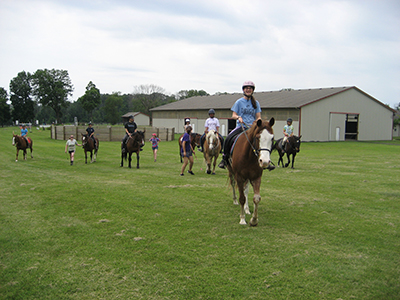

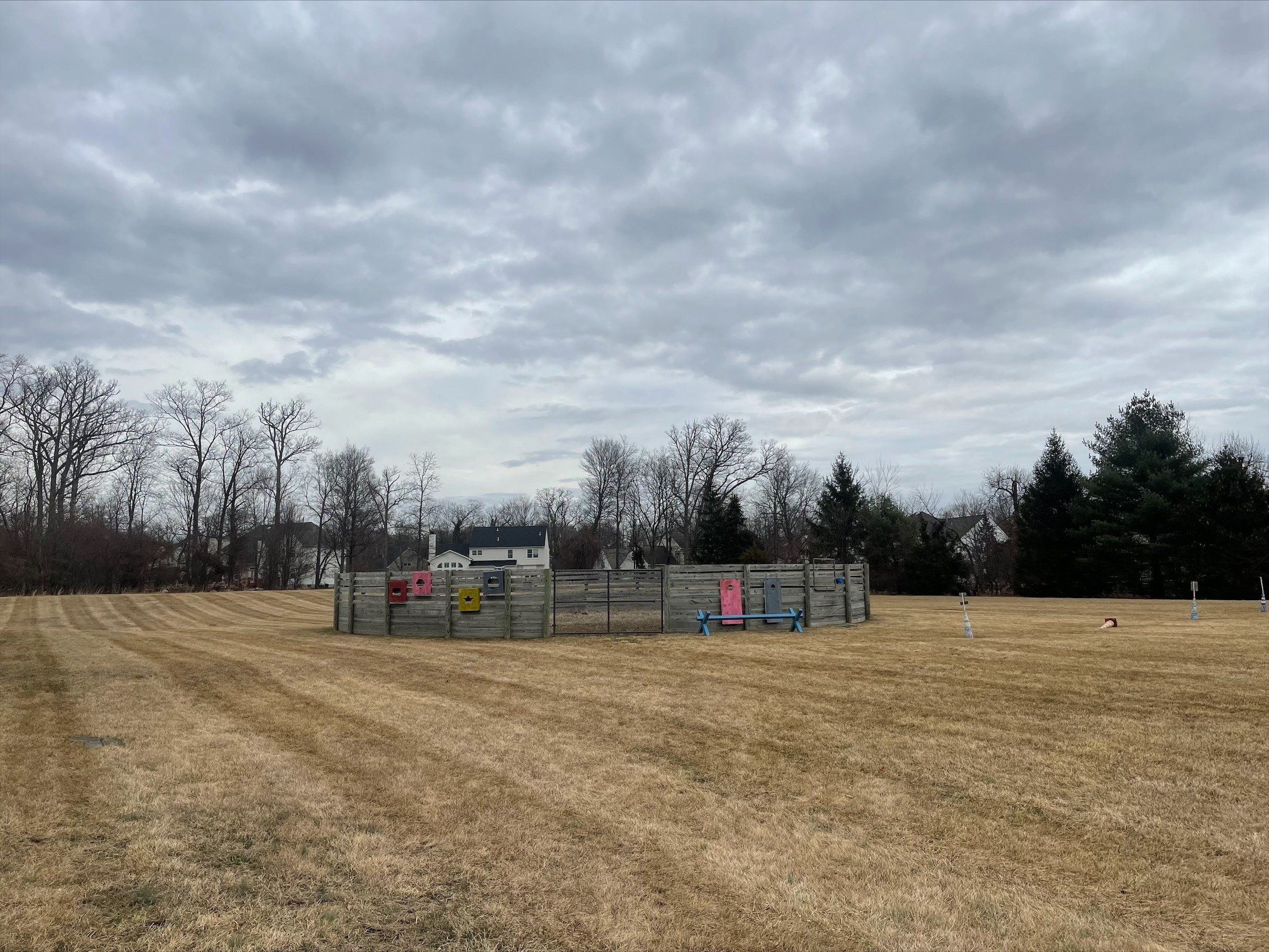
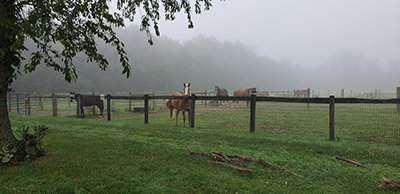

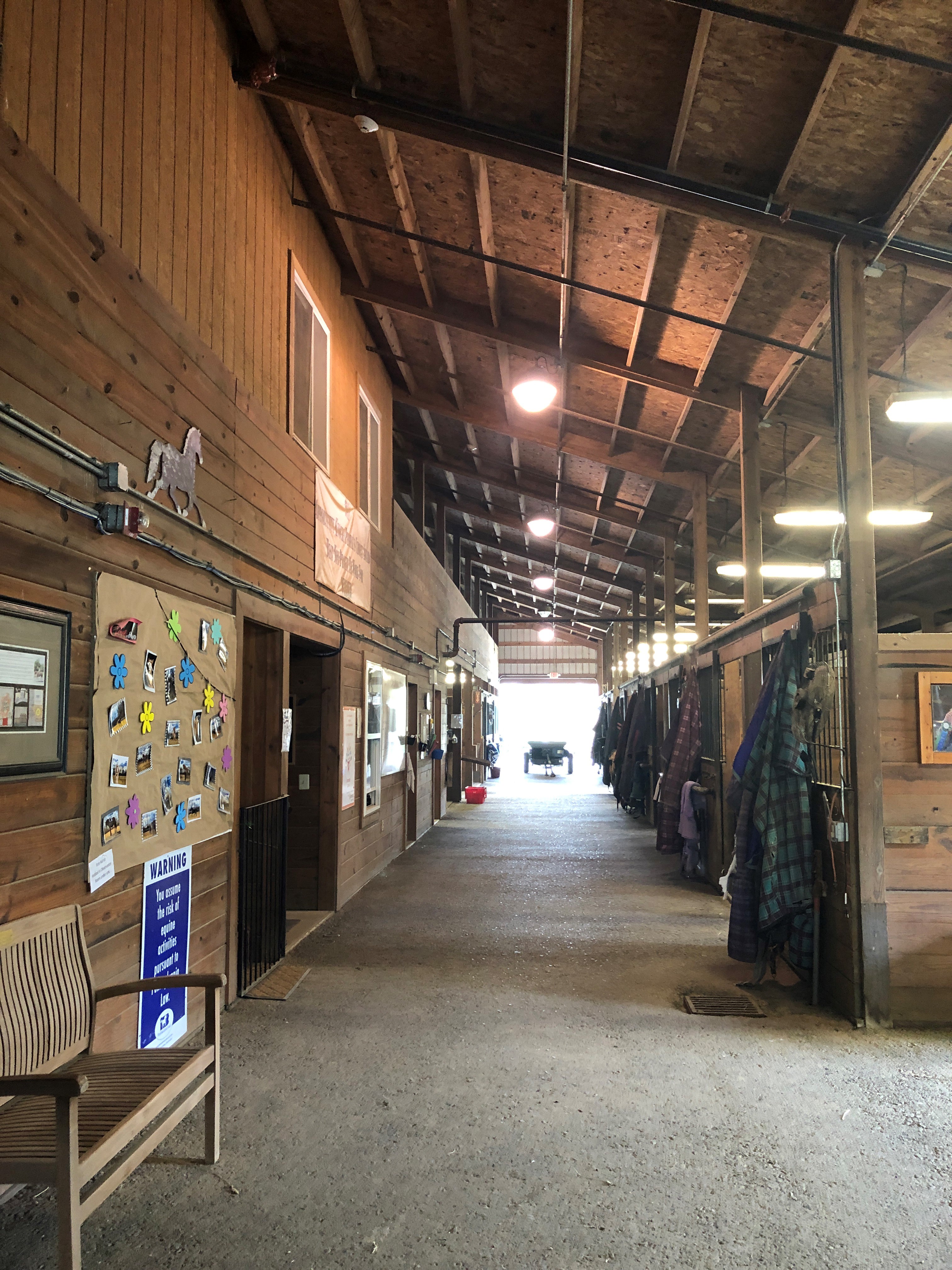

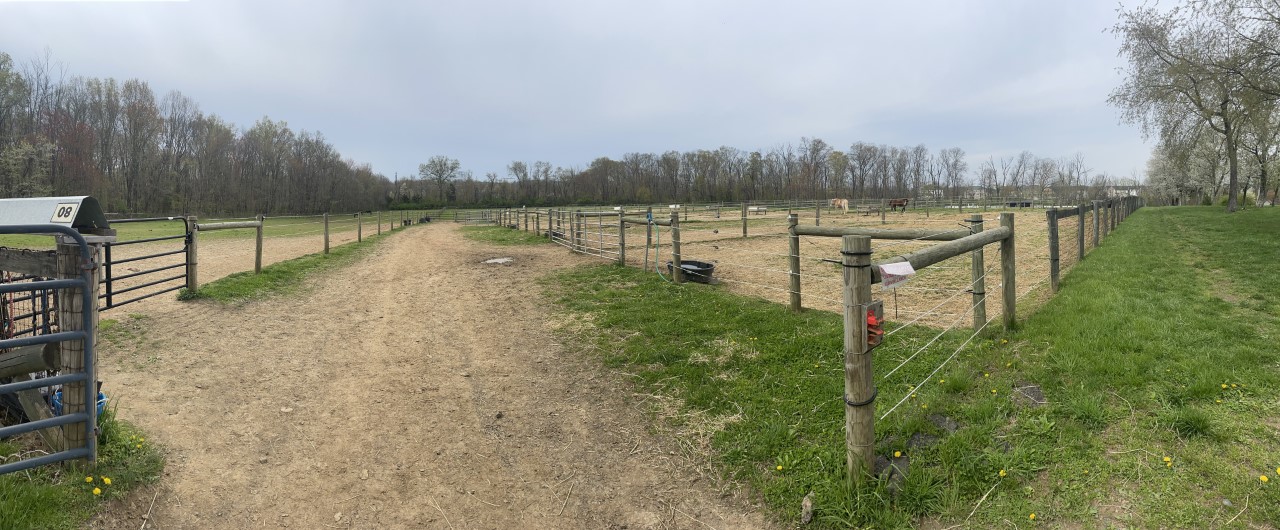
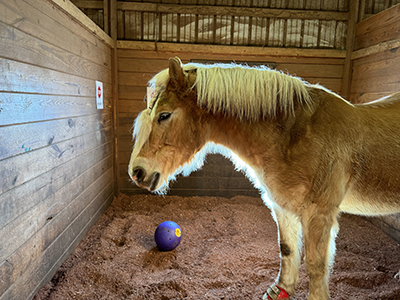

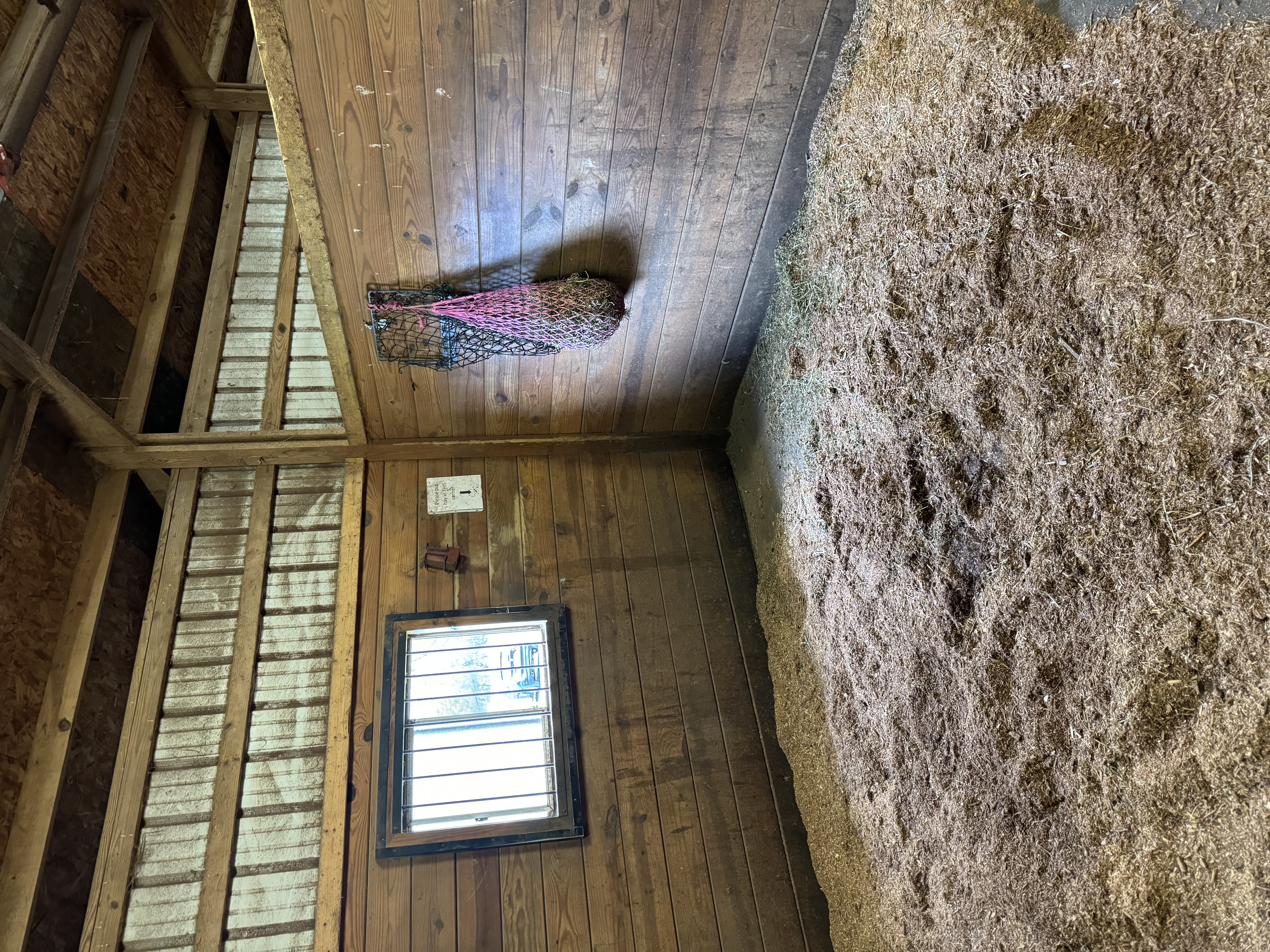

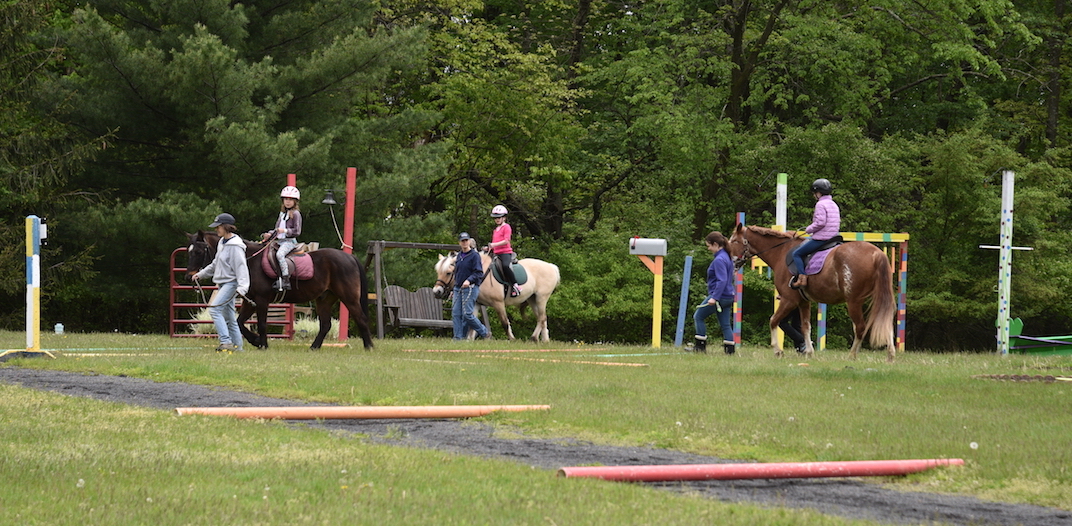
Are the organization's rules, restrictions and warnings (signage) conspicuously posted in easily accessible locations? Yes
Are the organization's emergency contacts, including veterinarian contact information, conspicuously posted in easily accessible locations? Yes
Are human and equine first aid kits easily accessible? Yes
Regarding all shelters where horses are housed including run-in sheds:
Do horses have assigned stalls in the barn/structure(s) or exclusively assigned shelter locations where they are separated from other horses with a barrier? Yes
How many hours per day, on average, are horses stalled or restricted to these sheltered exclusive shelter locations? 9-12
How often are the stalls/shelters cleaned, i.e., kept in good repair and free of standing water, accumulated waste, sharp objects and debris? 6-7 Days a Week
Do all stalls/shelters allow horses to lie down, stand up and turn around and provide protection from inclement weather (wind, sleet, rain, snow and extreme temperatures)? Yes
Are stalls/shelters kept in good repair, with adequate ceiling height, and free of standing water, accumulated waste, sharp objects and debris? Yes
Are floors constructed and maintained for both good drainage and traction? Yes
Is there a ventilation and circulation system in place to allow free flow of air to control temperature, and humidity, and to prevent air stagnation? Yes
Is wiring inaccessible to horses and maintained for safety in all areas of facility? Yes
Are fire prevention/protection measures (fire alarms, extinguishers and sprinkler systems) maintained and in good working order? Yes
Is there adequate lighting to ensure safety in all areas of facility? Yes
How many hours per day, on average, are horses turned out:
Equines are out 16+ hours per day
The following describes the pastures at this facility:
This facility has a written plan in place for pasture management, which includes guidelines for seeding, fertilizing, irrigation, mowing, dragging, harrowing, manure removal, removal of debris, the control of poisonous plants, and a schedule for cleaning
A dedicated staff person(s) is responsible for pasture management
All pastures are fenced to prevent escape or injury
Electric fencing is used; electric wires or tape fence are visibly marked
Fencing checks, such as broken or missing planks, loose fence posts, exposed or loose nails, detached wires, etc., are done regularly
Pastures are rotated
Pastures have natural protection for equines (i.e., trees)
Pastures have man-made protection for equines (i.e., shelters)
This facility does not have pastures where equines can graze on pasture grass
Barbed wire is used for fencing
The following describes the turnout areas other than pastures at this facility:
This facility has a written plan in place for the maintenance of turnout areas, which includes a schedule for cleaning, manure removal, and dragging
A dedicated staff person(s) is responsible for the maintenance of turnout areas
All turnout areas are fenced to prevent escape or injury
Electric fencing is used; electric wires or tape fence are visibly marked
Turnout areas have man-made protection for equines (i.e., shelters)
Fencing checks, such as broken or missing planks, loose fence posts, exposed or loose nails, detached wires, etc., are done regularly
This facility does not have turnout areas
Barbed wire is used for fencing
The following policies and procedures are in place at the facility to restrict public access and to keep horses safe:
There is a practice in place to monitor equines overnight
No Trespassing signs are posted
Hold Harmless signs are posted
Authorized Personnel Only signs are posted
Visitors are only permitted at specific times
Visitors are only permitted in specific areas
The property is fitted with motion lights
The property is fitted with a security system monitored by police or a professional service
The property is fitted with a security system that is monitored internally by staff (or the property owner)
The property owner, staff member or caretaker lives on the premises and ensures that public access is restricted and is responsible for the security of the facility and equines
A security guard is present at night
By Appointment Only signs are posted.
Entrance gates are locked at night
The perimeter of the property is fully fenced
Equine Care/Emergency Preparedness: Special Equestrians (*Main) 2026 and 2025 This section is required.
Horse Health Care/Barn Management Records: What system is used to collect and store health/horse care records?
Onsite computer with cloud-based backup storage system
The organization utilizes its own system to maintain records
The following items are consistent with our feed management plan and practices:
Equines are provided with individualized feeding plans, including supplements, according to the equine's age, breed/type, condition, size, work level and any health issues, consisting of nutritious food provided in sufficient quantity and access to adequate natural forage, or be fed daily, or as recommended by the organization's veterinarian
Feed plans are determined in consultation with a veterinarian
Supplement plans are determined in consultation with a veterinarian
Equines are fed grain in individual stalls
Staff and/or volunteers are trained in proper feed measurements and protocols and observed periodically to ensure they are feeding correctly
The feed chart is centrally located and updated as needed
The area(s) where hay, feed, grain, and supplements are stored are kept clean, free of debris and chemicals, and protected from weather and other animals in rodent-proof and mold-proof containers and grain bins
Feed, supplements and hay types are clearly labeled
Water sources, i.e., buckets, troughs, automatic waterers, etc. are kept clean, free of contaminants, debris and chemicals, protected from weather and other animals, and be positioned or affixed to minimize spillage.
Medications are kept in a secure area
Equines are fed grain in groups
Is clean, potable water available at all times for all equines? Yes
Hoof Care: How often is hoof care provided for each equine? Every 4-8 weeks and when an issue arises
Dental Care: How often is dental care provided for each equine? Annually and when an issue arises
Horse checks: How often are equines visually and physically checked by personnel at the facility? Every day or 6 days a week
Our organization has the following parasite and fly/insect control protocols in place, including remedies used to control flies and insects:
Fly/Insect Control Remedies:
Fly Traps and Tapes
Fly Spray Repellent
Fly Masks
Fly Sheets
Fans
Our organization follows the parasite control guidelines of our veterinarian, including fecal testing and de-worming
The following represent the biosecurity practices in place at facility:
Our organization follows the biosecurity guidelines of our veterinarian
Sick, affected and/or quarantined equines do not have contact with other equines or other animals
The organization has a written biosecurity plan
Staff are trained in best practices related to biosecurity
Volunteers are trained in best practices related to biosecurity
Sick, affected and/or quarantined equines are cared for last if the caretaker must also care for healthy equines
Restricted access signs are posted at primary points of access to sick, affected and/or quarantined equines
Hand sanitizers are available at all primary points of access to sick, affected and/or quarantined equines
Footbaths are available at all primary points of access to sick, affected and/or quarantined equines
Manure and bedding from sick, affected and/or quarantined equines is removed from the facility - not put in open air piles, and not spread on pastures
Quarantine areas, such as stalls, aisle ways, paddocks, and common areas, are cleaned (and needed, disinfected) after conclusion of the quarantine.
Trailers/vans used by sick, affected and/or quarantined equines are cleaned and disinfected after each use and cleaning takes place away from where equines are sheltered
Equipment used by sick, affected and/or quarantined equines is not shared
Equipment used by sick, affected and/or quarantined equines is cleaned of organic debris and disinfected after each use
Latex gloves, or equivalent gloves, are worn when working with sick, affected and/or quarantined equines
A specific individual is trained and assigned to care for sick, affected and/or quarantined equines
Equines are not quarantined on arrival.
The following represent the manure removal practices in place at facility:
Manure is piled in an area where equines are not located
Manure piles are composted or spread on pastures
Our organization adheres to the manure management guidelines set by the state, local authorities, and/or our organization's veterinarian
Manure is stored in dumpster(s)
Manure piles are covered
Manure is hauled, sold or given away
The following steps are taken to help staff and volunteers readily identify each horse on the property:
Equines are assigned the same exclusive stall/shelter location each day
Name plates are located on the stall/shelter location
Photos are located on the stall/shelter location
Equines wear halters with nametags
A notebook or binder with photos and information on each equine is easily accessible
Equine photos and profiles are available on the website
Staff/volunteers are provided training on conformation, markings, colors, and breeds
Team leaders work with new staff/volunteers until they are able to identify the equines
A map/diagram is posted showing the location of each equine with equine names and photos
Staff and volunteers are provided with an information packet with equine profiles, including photos and detailed descriptions
Our organization has the following policies and procedures in place pertaining to tack, apparel and equipment:
All equines have specifically assigned apparel, equipment and tack (saddles/bridles if ridden) that is not shared
Saddle pads are shared
Blankets, sheets and turn out apparel are fitted and utilized for each equine appropriate to the equine's needs and the weather conditions
Blankets, sheets and turn out apparel are cleaned regularly as needed
Riding Tack is always cleaned after each use
Riding Tack is inspected for overall working condition before each use by trained personnel
Riding Tack is assessed for fit before each use by trained personnel
Riding Tack is assessed for fit by trained personnel when an equine's body condition changes
Riding Tack is assessed for fit by trained personnel when an equine's disposition changes
Assigned riding tack is clearly labeled
Riding Tack is stored in a climate-controlled location
Helmets are shared
Helmets are cleaned/disinfected after each use
Helmets are replaced after a fall
Helmets are replaced at least every five years.
Saddles are shared
Bridles are shared
Bits are shared
Blankets are shared
Sheets are shared
Turnout apparel is shared
Halters are shared
Riding Tack is always cleaned at least weekly
Riding Tack is cleaned only when needed
This facility enlists the services of a professional saddle fitter at least once a year
No equines are ridden; saddles, bridles, etc. not applicable.
Emergency Preparedness: Special Equestrians: *Main This section is required.
The following plans, policies, and procedures are in place at the facility to handle emergencies and address weather related issues, fire safety procedures, and/or any additional hazardous scenarios the facility could potentially experience:
Emergency procedures are posted prominently
The facility maintains at least two weeks of hay, feed, shavings and medications
The facility collects and maintains medical information from staff, volunteers, and clients
The facility maintains appropriate liability and/or workers' compensation insurance
The organization has a written emergency preparedness/safety plan (EPP)
The facility owns or has access to a generator
Local fire department and/or the state's emergency planning department procedures
Medical emergencies for clients, staff, and volunteers
Medical emergencies for equines
Evacuation plans
Power outages
Fire
Natural Disasters - thunderstorm, hurricanes, earthquakes, tornados, etc
Protocols to notify emergency personnel
Building/facility exit plans
Terrorist attacks
The facility follows the specific procedures to help PREVENT emergency situations:
Smoking is strictly prohibited
NO SMOKING signs are posted prominently
Permanent or temporary structures where equines are stalled are kept free of dust, cobwebs, trash, cleaning rags, and other flammable items
Aisles and doorways are kept clear
Hay is stored away from permanent or temporary structures where equines are stalled
Heaters with automatic shutoff settings are used
How often are the following checked or performed?
Fire Extinguishers are checked: Semi-annually
Smoke detectors are checked: Quarterly
Fence lines are checked: Daily
Turnout Areas are checked: Daily
Sprinkler systems are checked: Semi-annually
Fire drills are conducted: Not at all/NA
Review of safety protocols with staff are conducted: Quarterly
Review of safety protocols with volunteers are conducted: Monthly
The Emergency Preparedness Plan is reviewed and updated: Annually
Equine Transportation: 6= Onsite: 2 (1 + 1) + Offsite: 4
2-horse van/trailer with truck:
1 Owned onsite 1 Access onsite but not owned 3 Access offsite;
3-horse van/trailer with truck:
1 Access offsite;
© Copyright 2018 EQUUS Foundation 98 3.00